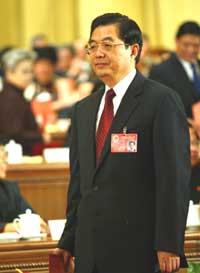The Rise of Hu
Top level politics in China are a complex combination of symbolic and substantive actions. The actions taken at the recent session of the Party Central Committee were definitely symbolic. We'll have to wait for later reports to find out if substantive actions were also taken.A Reuters report on the New York Times web site describes some more about Hu Jintao's rise in China.
China Party Praises Hu's Harmony Doctrine

"China's ruling Communist Party lauded President Hu Jintao's doctrine of creating a 'harmonious society' on Wednesday, underscoring his growing strength as the party announced plans for a key congress next year...
"He has summed up his agenda by calling for a 'harmonious society' that narrows inequality and eases social strains, and the meeting put his theme on a higher ideological pedestal...
"Wednesday's decision will allow Hu to nudge aside the legacy of his predecessor, Jiang Zemin, who ushered capitalists into the Communist Party. Many of Hu's colleagues in the party's inner circle are Jiang proteges, and Hu is likely to push some into retirement at the 17th Congress or before.
"Initial Chinese media reports left unclear whether the closed-door meeting had taken any decisions regarding Chen Liangyu, the powerful party boss in Shanghai..."
In case you want a reminder about Hu's "harmonious society," here is and excerpt from the People's Daily article of 27 June 2005:
Building harmonious society crucial for China's progress: Hu
"Chinese President Hu Jintao instructed the country's leading officials and Party cadres to place 'building a harmonious society' top on their work agenda, when addressing a high-level Party seminar.
"'The CPC and the central government have made it an important task to build a harmonious society, as China is facing thorny domestic issues, as well as complicated and volatile international situations,' said Hu, who is also general secretary of the Central Committee of the Communist Party of China (CPC)...
"'A harmonious society should feature democracy, the rule of law, equity, justice, sincerity, amity and vitality,' Hu said.
"Such a society will give full scope to people's talent and creativity, enable all the people to share the social wealth
brought by reform and development, and forge an ever closer relationship between the people and government. 'These things will thus result in lasting stability and unity,' Hu said.
"To meet this goal, Hu told the country's high-ranking officials to:
- Strive for sustained, rapid and coordinated economic growth...
- Develop socialist democracy...
- Actively enforce the principle of rule of law...
- Strengthen ideological and ethical buildup...
- Maintain social equity and justice...
- Establish a fine-tuned social management system and well handle the people's internal contradictions...
- And to beef up environmental protection...
See the earlier post here, "Eight Glories and Eight Shames."



2 Comments:
It seems that the link offered here is a generic one to the latest Reuters news item on China and that the article I quoted is no longer accessible.
The "anti-corruption" campaign seems to have moved to the capital, but the goals seem to be the same.
China’s Corruption Inquiry Targets Beijing Leaders
"A widening Chinese anti-corruption probe has targeted Beijing’s party leaders, a sign that President Hu Jintao intends to continue removing officials he considers insufficiently loyal, people told about the leadership’s planning said...
"Nearly all of those implicated to date are viewed as loyalists to China's former top leader, Jiang Zemin, or as having resisted the policies of Mr. Hu, the party boss since 2002.
"As such, the ongoing crackdown serves two purposes... [Leaders] have sought to warn underlings that they intend to punish corruption... [but] have also signaled that only those they consider political allies will have the power to resist probes into their financial affairs. That message seems designed to shore up support as the party prepares to undergo its five-yearly political transition with the convening of the 17th Party Congress next fall...
"The probe has significant policy implications... China remains too vulnerable to boom-bust economic cycles. If today’s double-digit growth rates tumble, the resulting slowdown could threaten social stability and the ruling party’s hold on power..."
Post a Comment
<< Home